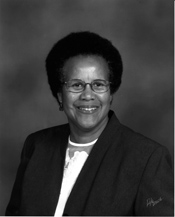SSA Centennial Celebration
Profiles of Distinction Series
E. Aracelis Francis, A.M. 1964
Retired Director, CSWE Minority Scholarship Program
Adjunct Associate Professor, Howard University
Council on Social Work Education, 1986–2007
“I have always been interested in understanding different cultures,” states Aracelis Francis. Although she grew up on the island of St. Thomas in the Virgin Islands, a U.S. territory, she has spent much of her adult life in the United States.
Ms. Francis received her bachelor’s degree from the Inter-American University in Puerto Rico in 1960. Returning to her birthplace, she worked in the Child Welfare Division for the Virgin Islands’ Department of Social Welfare. To better her understanding of systems management, Ms. Francis soon began searching for a social work program at the master’s level. She considered Columbia University, the University of Pennsylvania and SSA as her top choices because their urban locations would offer an environment that contrasted with her island upbringing. She ultimately chose SSA because, although she was in the clinical track, she could take courses in supervision, administration, and community organization.
Ms. Francis recalls that, despite her work experience in the Virgin Islands, the transition from her education at a small Puerto Rican college to SSA was trying. Beyond the initial difficulty, however, SSA’s full approach to social welfare broadened her goals considerably. It was the tumultuous 1960s, and new thinking and new opportunities were developing in the field.
Ms. Francis credits several faculty members and programs with setting her on a course for success. She recalls, “I learned how to interview and analyze data while working on William Reid’s (William J. Reid, Ph.D.) research project on developing the brief treatment clinical program. Charlotte Towle (Charlotte Towle, Ph.D.) brought theories to life by using novels to illustrate the dynamics of human development. Also, being from the warm Islands, I was fascinated by her brown fur coat, which seemed to defy the Chicago winters! My field instructor supervisor, Bertha Swindall (Bertha Swindall, A.M.), became a role model for my later work in the Virgin Islands.”
After earning her A.M., Ms. Francis again returned to the Islands as Chief of the Bureau of Day Care Services. She implemented the first government operated day care center on the island of St. John, also in the Virgin Islands, and educated her fellow islanders on what constitutes quality childcare. Although she achieved success in the role, she felt she needed to learn more about planning, policy, and administration to advance. She was particularly concerned with the cultural dissonance that often arose when change was needed. She states, “At that time, people on the island were more isolated, and they tended to do things as they always did. It was difficult to get them to change.”
Ms. Francis enrolled in the Columbia University School of Social Work, completing her DSW in 1979. While working toward her doctorate, she joined Adelphi University’s School of Social Work as an assistant professor. Concurrently, she found a position with the Council on Social Work Education (CSWE) as a research associate addressing the lack of diversity and cultural understanding in the social work curriculum. She worked closely with Carl Scott, Associate Director of the CSWE.
Through Mr. Scott, she was appointed chair of the Council’s Commission on Minority Group Concerns. As a result of the commission’s work, CSWE received a grant from the National Institute of Mental Health (NIMH) to launch its Minority Fellowship Program in 1975. The program would educate minority social workers at the doctoral level to teach in the social work curricula and conduct research. Mr. Scott served as its first director.
In 1975, Ms. Francis returned home once more as the Executive Director of the Office of Planning and Development of the Department of Social Welfare. After nearly five years in that role, she was chosen for a highly competitive one year internship as a Health and Human Services (HHS) Fellow at the Office of Refugee Resettlement, in Washington, D.C. She would not live in the Virgin Islands again for almost 30 years.
In the early 1980s, Ms. Francis became an assistant professor in the Social Administration Concentration at the University of Maryland, with teaching duties that included a course on racism and social welfare. In 1986, she succeeded Mr. Scott as director of the CSWE Minority Fellowship Program, and during her tenure, she became a “den mother” for many of the tenured minority faculty members teaching in schools of social work in the United States today. Recent records show that the program has supported approximately 500 candidates over the years.
Ms. Francis retired in 2007, leaving the program as her extraordinary legacy to social work education.
Ms. Francis states, “My education at SSA contributed several major perspectives to my CSWE work. My work with the faculty (Reid, Towle, and Swindall, in particular) in analyzing problems and issues enabled me to navigate between the very different systems of the schools of social work education and the federally regulated NIMH and SAMHSA Fellowship Programs. Also, during the 1960’s, SSA was shaped by the values of self-determination and empowerment. I translated these values to my work with the doctoral students by always respecting their abilities and different cultures, and by encouraging them in their belief that they could make a difference.”
